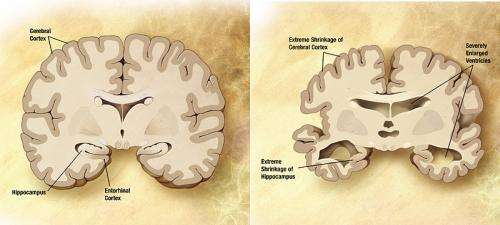Beta secretase inhibitors to treat Alzheimer's disease

With each new amyloid-targeting treatment for Alzheimer's disease that has been developed, there has been a corresponding concern. For example, antibodies targeting amyloid-β peptide (Aβ) produce inflammation in the brain in some patients. Gamma secretase inhibitors tend to produce adverse effects by interacting with Notch, an important pathway for cellular signaling.
Beta secretase 1 (BACE1) inhibitors are a new and promising target for Alzheimer's disease. Inhibiting BACE1 will limit the production of Aβ which, in turn, should reduce the production of neurotoxic fibrils and plaques.
"Since several BACE1 inhibitors are currently being evaluated in clinical phase 3 trials for the treatment of Alzheimer's disease, the identification of potential side effects will be of great importance to ensure a positive clinical outcome," said Dr. Jochen Herms, a Professor of translational brain research at Ludwig-Maximilians-University Munich.
He and his team have now gathered that data by exploring the impact of long-term BACE1 inhibition on dendritic spine dynamics, synaptic functions, and cognitive performance in adult mice. Their work is published in the current issue of Biological Psychiatry.
They found that pharmacological BACE1 inhibition reduced dendritic spine dynamics, reduced neurotransmission, and impaired cognition. Importantly, however, these disruptive effects were dose dependent.
Dr. Herms explained, "Our study demonstrates that moderate inhibition of BACE1 might be therapeutically efficient without any overt signs of health impairments. On the contrary, we found that strong inhibition of BACE1 in mice causes structural and functional synaptic alterations with deterioration of cognitive performance."
Dr. John Krystal, Editor of Biological Psychiatry, commented, "Alzheimer's disease presents such a terrible burden on individuals, families, and society that if BACE1 inhibitors produce beneficial effects on the course of this disorder, it is well worth the effort to try to understand and circumvent this new risk."
Indeed, the clinical efficacy of BACE1 inhibitors remains unknown until the phase 3 trials currently underway are completed. In the meantime, these findings suggest that careful dosage of BACE1 inhibitors will be necessary to avoid potential adverse effects. The authors urge utmost caution in the dosage of drugs targeting BACE1 in order to achieve a therapeutic window that balances both safety and efficacy.
More information: The article is "Pharmacological Inhibition of BACE1 Impairs Synaptic Plasticity and Cognitive Functions" by Severin Filser, Saak V. Ovsepian, Mercè Masana, Lidia Blazquez‐Llorca, Anders Brandt Elvang, Christiane Volbracht, Marianne B. Müller, Christian K.E. Jung, and Jochen Herms (DOI: 10.1016/j.biopsych.2014.10.013). The article appears in Biological Psychiatry, Volume 77, Issue 8 (April 15, 2015)


















